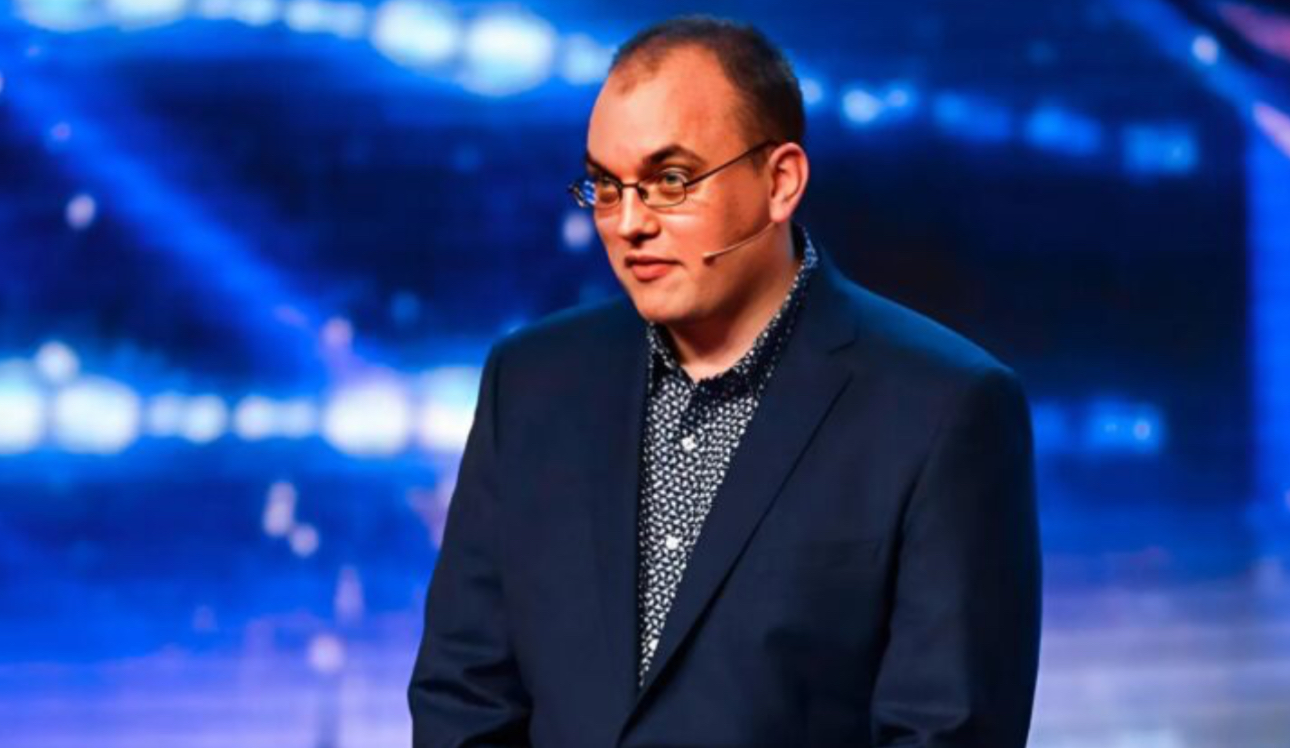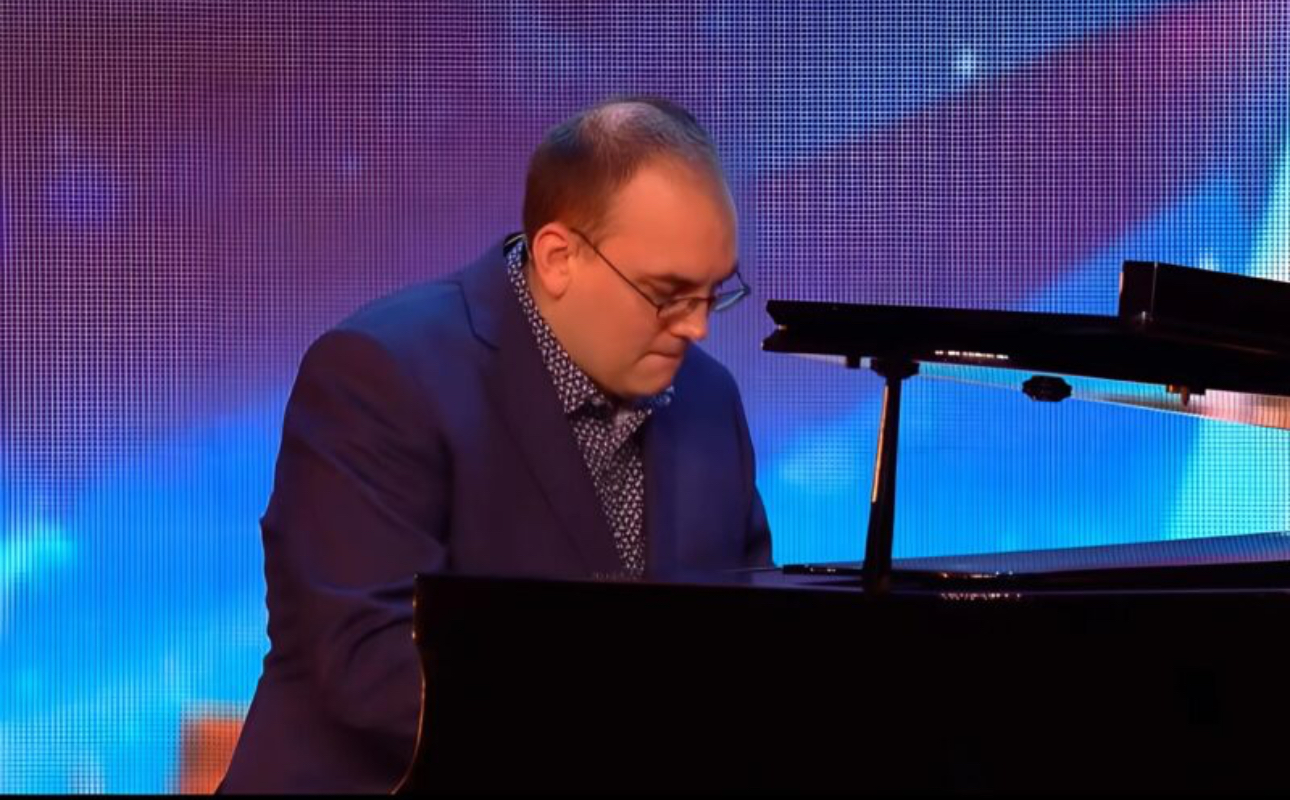When Nicholas Bryant, a reserved investment banker, stepped onto the stage of Britain’s Got Talent, there was little reason for anyone to expect something extraordinary. His modest suit, neat hair, and almost shy body language painted the picture of a man more accustomed to spreadsheets and boardrooms than to the bright lights of a stage. He introduced himself quietly, and though polite, his demeanor carried no hint of the spectacle to come. The audience, used to contestants who arrive brimming with charisma and bold promises, offered polite applause tinged with skepticism. The judges exchanged glances that spoke volumes—this might be another performance destined to fade into forgettable mediocrity.
As Nicholas took his seat at the piano, the room seemed to exhale in anticipation. His hands hovered briefly above the keys, and then he began to play. In an instant, everything changed. His fingers moved with confidence and elegance, producing a melody that was both rich and deeply expressive. The notes flowed like water, delicate yet commanding, and the sound filled the auditorium with a warmth that demanded silence. The audience’s chatter evaporated, replaced by a hushed awe. It was as though the piano itself had become his voice, revealing layers of emotion hidden beneath his reserved exterior.

For those first moments, it was just Nicholas and the piano. But then, just as the piece reached an emotional swell, something unexpected happened. From the shadows at the edge of the stage, a violinist emerged, bow poised and ready. With seamless timing, the violin joined the piano’s melody, its tone soaring above the keys, intertwining with Nicholas’s playing as if the two musicians had been telling the same story all along. The audience gasped in surprise, eyes darting between the stage and the judges’ reactions, which were now shifting from polite interest to stunned amazement.
But that was only the beginning. As the piece continued to build, another surprise unfolded. Scattered throughout the audience, musicians began to rise from their seats, instruments in hand. A cellist here, a trumpeter there, followed by flutists and percussionists who had been hidden among the crowd. One by one, they joined in, their music blending perfectly with the piano and violin. What started as a solo performance had transformed into a hidden orchestra that surrounded the room with sound. The effect was electrifying. Brass added boldness, strings wove richness, and percussion gave rhythm and strength. The music grew more powerful, more intricate, and more moving with each passing moment.
The judges were visibly taken aback. Simon Cowell, who had moments earlier looked as though he was bracing for disappointment, now leaned forward in astonishment, his eyes wide and fixed on the stage. Amanda Holden placed a hand over her mouth, clearly moved by the sheer ambition of the performance. Alesha Dixon’s face lit up with delight, and David Walliams beamed, his hands clapping along as the orchestra’s energy filled the room. Skepticism had turned into pure admiration, mirrored by the gasps and cheers that rippled through the audience.
Just when it seemed the performance had reached its pinnacle, Nicholas had yet another surprise in store. From the balcony above, a choir rose to their feet, their voices joining the swelling music. The harmonies cascaded down into the auditorium, their sound soaring over the orchestral foundation. The effect was overwhelming—voices and instruments together creating a wall of sound that was both powerful and profoundly moving. Audience members craned their necks to take in the spectacle, some wiping away tears, others shaking their heads in disbelief. The theater, once filled with doubt, now pulsed with energy, united in the experience of something truly remarkable.
The composition built toward its finale with dramatic precision. Nicholas, still at the piano, anchored it all, his playing unwavering even as the music around him expanded into a symphonic and choral masterpiece. Every layer added depth, and every crescendo pulled the audience further into the performance. It was not just music; it was theater, storytelling, and emotion all wrapped into one. The surprise of it all heightened the impact—what began as the solitary notes of a man who seemed out of place on such a stage had blossomed into an unforgettable display of creativity and unity.

When the final note rang out, it seemed to hover in the air, echoing in the silence before dissolving. For a brief moment, the room was still, as though no one wanted to break the spell. And then, like a wave crashing against the shore, the audience erupted into thunderous applause. Cheers and shouts of admiration filled the hall as people leapt to their feet in a standing ovation. The applause was deafening, a roar of appreciation that seemed to go on endlessly. Musicians smiled as they lowered their instruments, the choir beamed from above, and Nicholas himself sat at the piano, looking both relieved and overwhelmed by the reaction.
The performance had been more than just a display of talent. It was a revelation, a reminder that brilliance often hides behind unassuming appearances. Nicholas had walked onto that stage as a reserved banker, someone few expected to leave much of an impression. But with creativity, vision, and the courage to deliver something truly unique, he had transformed the stage into a symphonic wonder. His audition wasn’t simply about playing a piano piece—it was about orchestrating a moment that spoke to the power of surprise, collaboration, and art.
Long after the applause faded, the memory of that audition lingered. For the audience in the theater, it was a story they would recount for years: the night an investment banker fooled them all by delivering one of the most breathtaking performances in Britain’s Got Talent history. For those watching at home, it became one of those viral moments, shared across social media and replayed countless times, proof that magic can come from the most unexpected places.
Nicholas’s audition was a testament to the beauty of creativity and the joy of being surprised. It showed that talent is not always loud or obvious—it can be hidden behind quiet eyes, waiting for the right stage to reveal itself. That night, a man who had walked in as a modest contestant walked out as an artist, leaving behind a performance that reminded everyone watching that true brilliance often shines brightest when you least expect it.







